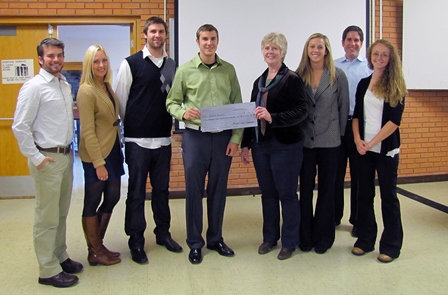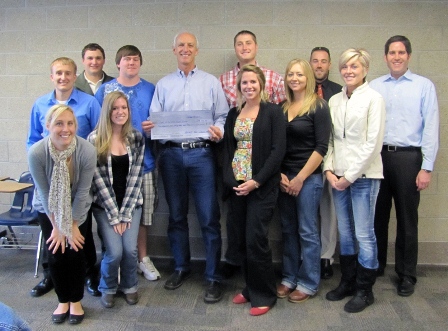Entreprentice Assignment Gives Students First-Hand Entrepreneurial Experience
Last fall Brent Rosso, College of Business (CoB) management assistant professor, charged his entrepreneurship students with The Entreprentice Challenge: to start, run and make money from a business with only $25 to $50 in start-up capital during their first three weeks of class. Rosso randomly selected teams of five members each, and put up $25 in seed money for each group, to start the challenge. Students had the option to match the initial investment with an additional $25.
 “I wanted to provide an opportunity for students to have an entrepreneurial experience
right at the start of the course that offered a quick, micro-scale approximation of
the joys, challenges and frustrations inherent in the entrepreneurial process,” said
Rosso. “The aggressive, three-week period for this challenge was intended to instill
a sense of urgency and stimulate their creativity. It also required them to bootstrap’
their resources, which provided a pretty low-risk opportunity for students to exercise
and learn from their entrepreneurial instincts.”
“I wanted to provide an opportunity for students to have an entrepreneurial experience
right at the start of the course that offered a quick, micro-scale approximation of
the joys, challenges and frustrations inherent in the entrepreneurial process,” said
Rosso. “The aggressive, three-week period for this challenge was intended to instill
a sense of urgency and stimulate their creativity. It also required them to bootstrap’
their resources, which provided a pretty low-risk opportunity for students to exercise
and learn from their entrepreneurial instincts.”
Students could launch any type of business they chose, as long as the business was legal, ethical and conformed to Montana State University (MSU) and CoB guidelines. Student groups were required to pay back the initial $25 investment at the end of the challenge and to donate 20 percent of their profits to a local non-profit organization selected by the entire class. Teams came up with a variety of creative businesses from selling parking spaces to Bobcat football fans, creating MSU sports-themed items to sell such as t-shirts, bumper stickers and Styrofoam Bobcat heads on a stick, to offering Hugs for Donations in downtown Bozeman on a weekend night.
One team that experienced phenomenal success in the Entreprentice used a member’s contacts to partner with Town & Country Foods (T&C) to sell parking spaces to football fans on two consecutive Saturdays. Their first weekend selling spaces during the first home football game of the season the team raised more than $500 for three hours’ work.
“We provided signage and team members were stationed on-site to direct drivers to spaces and collect money,” said Greg Castle, T&C parking team member. “We were stunned by the amount of money we raised, with such a simple idea, and were surprised it hadn’t been done before.”
Overall, for two Saturdays’ work, the T&C team raised $1,127.70 in profits, with only $11.30 in expenses. Many parking patrons donated more than $10 for their parking spaces, as team members told them the money was going to Eagle Mount, a local non-profit that provides therapeutic recreation for people with disabilities and children with cancer.
The T&C team agreed to donate all their profits to Eagle Mount, not just the 20 percent required by Rosso, and most of their classmates followed suit.
“The students really rose to the challenge,” explained Rosso. “I was impressed with the ingenuity and resilience the students demonstrated, even in the face of considerable obstacles and limited resources. The groups came up with some really creative business ideas, and did an excellent job leveraging the skills, experiences and resources at their disposal to bolster their success. I think they surprised themselves with how much they were able to accomplish with so little time and money.”
Both classes raised a combined total of $2,690.45, and a majority of the groups volunteered to give all their profits to charity. Students presented a total of $1,907.95 in charitable donations to representatives of Eagle Mount and Heart of the Valley Animal Shelter, during class presentations
 “I was impressed with the variety of projects and with the students’ professionalism
in presenting the ideas they had generated,” said Mary Peterson, executive director
of Eagle Mount. “Their profit-making strategies worked out brilliantly.”
“I was impressed with the variety of projects and with the students’ professionalism
in presenting the ideas they had generated,” said Mary Peterson, executive director
of Eagle Mount. “Their profit-making strategies worked out brilliantly.”
This experience has led a handful of teams to continue pursuing the businesses they launched through the Entreprentice. The T&C team’s success in selling parking spaces inspired the owners of T&C to offer this opportunity to other non-profit groups, as fall fundraisers. And local ski shops are still selling another team’s custom stickers.
“After competing in The Entreprentice, I realized that recognizing a need is the complicated part, not starting a business,” said Castle. “It took our entire team, working together, to make this idea a success.”
Rosso plans to continue the exercise in his entrepreneurship classes next fall, but may add new dynamics to the challenge. Those students will face the same obstacles, mobilizing resources with limited budgets and severe time constraints, and will get a taste of the complex dynamics of start-up entrepreneurship, from the ground up.

